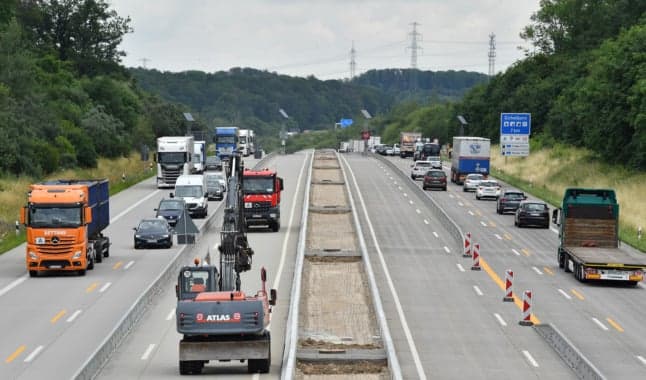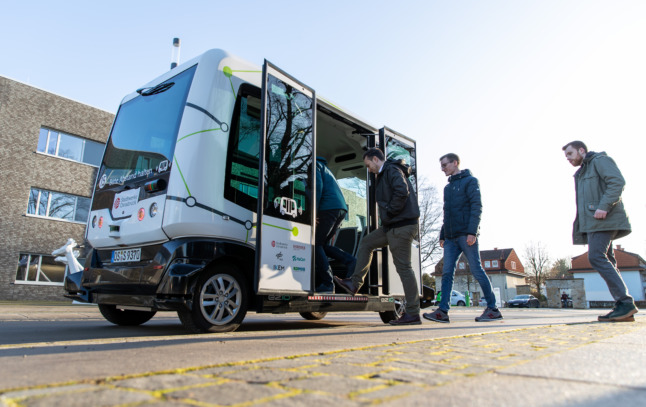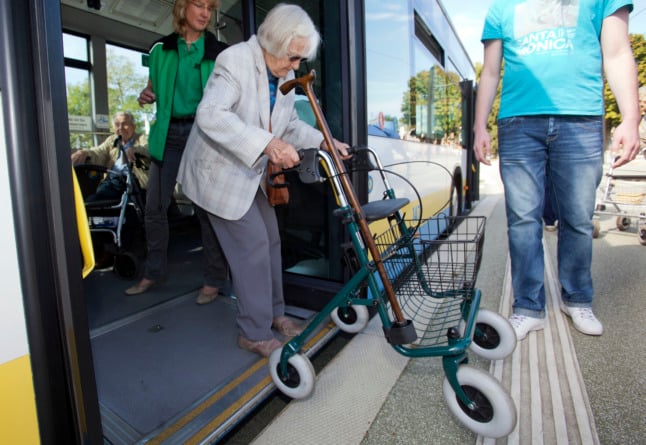German public transport slammed as 'failure' as half of users switch to car

The use of Germany's buses, trains and trams has plummeted during the Covid pandemic, with many opting to go by car instead - and according to a new study, the trend shows no sign of reversing any time soon.
The previously unpublished study, which was carried out by Berlin's Social Science Research Centre (WZB) and the social research institute Infas, shows that people are continuing to choose car travel over trains and buses in spite of the easing of many Covid restrictions and a return to public life.
READ ALSO: Why (and where) Germans are choosing to go on holiday by car this year
In Spring 2021, almost half of all public transport users were instead travelling by car - compared to just a third at the height of lockdown.
The trend, in fact, is moving in the opposite direction of the climate targets for the transport sector, which dictate that the number of people using public transport needs to double over the coming years.
"As the backbone of the transport revolution, public transport is currently a total failure," WZB's transport researcher Andreas Knie told German daily Spiegel.
A lack of flexibility?
The fact that car use has increased in spite of the easing of lockdown restrictions suggests that factors other than the pandemic are at play in the migration to private rather than public modes of transport.
These include inflexible schedules and problems with routes that might make it less a less attractive option for people who drive.
According to the research, private vehicles remain the number one choice for around 60 percent of travel routes in Germany.
READ ALSO: Deutsche Bahn warns of worst-ever loss due to pandemic
"That many respondents are avoiding mass transit because of Covid-19 is only half the truth," the researchers explained. "The other part of the story is that the lack of flexibility and low quality of the product are strong motives for avoiding public transport."
Researchers believe that public transport providers are facing a "structural crisis" as they struggle to adapt to the changed realities of the post-pandemic working world.

Researches believe on-demand shuttle buses could be a public transport option that's well suited to the post-pandemic world. Photo: picture alliance/dpa | Friso Gentsch
With more flexible working arrangements, employees who work from home may want services that allow them to nip into the office in the afternoon at short notice, or just for a few hours - but are frustrated by the limited options or lack of speedy connections.
Researchers suggest that services such as on-demand shuttle buses that could be ordered via app could be a solution to this. But outside of small pilot projects around the country, there's been little movement in this direction so far.
Another issue facing transport providers is that products such as monthly and annual tickets are increasingly out of step with passengers' daily lives and needs.
Instead, pay-as-you-go systems where the cheapest tariffs are automatically calculated on a chipcard or app could give people both the flexibility and value they want, the researchers explained.
Social division
The study's data, based on representative surveys, interviews and tracking data from an app, also revealed a deep social divide across different modes of transport.
"Beyond the metropolises like Hamburg or Munich, higher earners hardly use public transport at all," Knie told Spiegel.
With higher-income groups making up just two percent of kilometres travelled by public transport, options such as buses and trains are "practically non-existent" for the wealthy, he added.

The people still using public transport tend to be those who have no other choice, like elderly people who can no longer cycle. Photo: picture alliance / dpa | Jens Büttner
Public transport options, meanwhile, "are used by those who have no other choice," the researcher concluded.
This group includes older people who no longer cycle and poorer people who aren't able to travel the often long distance to work by car.
READ ALSO: ‘Infringement on air quality’: EU court slams Germany for pollution in cities
Conversely, researchers found that the number of kilometres travelled by car goes up in relation to income.
The upshot is that the transition to sustainable transport that's long been hoped for by climate protectionists and urban developers could take much longer in Germany than previously thought.
Comments (5)
See Also
The previously unpublished study, which was carried out by Berlin's Social Science Research Centre (WZB) and the social research institute Infas, shows that people are continuing to choose car travel over trains and buses in spite of the easing of many Covid restrictions and a return to public life.
READ ALSO: Why (and where) Germans are choosing to go on holiday by car this year
In Spring 2021, almost half of all public transport users were instead travelling by car - compared to just a third at the height of lockdown.
The trend, in fact, is moving in the opposite direction of the climate targets for the transport sector, which dictate that the number of people using public transport needs to double over the coming years.
"As the backbone of the transport revolution, public transport is currently a total failure," WZB's transport researcher Andreas Knie told German daily Spiegel.
A lack of flexibility?
The fact that car use has increased in spite of the easing of lockdown restrictions suggests that factors other than the pandemic are at play in the migration to private rather than public modes of transport.
These include inflexible schedules and problems with routes that might make it less a less attractive option for people who drive.
According to the research, private vehicles remain the number one choice for around 60 percent of travel routes in Germany.
READ ALSO: Deutsche Bahn warns of worst-ever loss due to pandemic
"That many respondents are avoiding mass transit because of Covid-19 is only half the truth," the researchers explained. "The other part of the story is that the lack of flexibility and low quality of the product are strong motives for avoiding public transport."
Researchers believe that public transport providers are facing a "structural crisis" as they struggle to adapt to the changed realities of the post-pandemic working world.

Researches believe on-demand shuttle buses could be a public transport option that's well suited to the post-pandemic world. Photo: picture alliance/dpa | Friso Gentsch
With more flexible working arrangements, employees who work from home may want services that allow them to nip into the office in the afternoon at short notice, or just for a few hours - but are frustrated by the limited options or lack of speedy connections.
Researchers suggest that services such as on-demand shuttle buses that could be ordered via app could be a solution to this. But outside of small pilot projects around the country, there's been little movement in this direction so far.
Another issue facing transport providers is that products such as monthly and annual tickets are increasingly out of step with passengers' daily lives and needs.
Instead, pay-as-you-go systems where the cheapest tariffs are automatically calculated on a chipcard or app could give people both the flexibility and value they want, the researchers explained.
Social division
The study's data, based on representative surveys, interviews and tracking data from an app, also revealed a deep social divide across different modes of transport.
"Beyond the metropolises like Hamburg or Munich, higher earners hardly use public transport at all," Knie told Spiegel.
With higher-income groups making up just two percent of kilometres travelled by public transport, options such as buses and trains are "practically non-existent" for the wealthy, he added.

The people still using public transport tend to be those who have no other choice, like elderly people who can no longer cycle. Photo: picture alliance / dpa | Jens Büttner
Public transport options, meanwhile, "are used by those who have no other choice," the researcher concluded.
This group includes older people who no longer cycle and poorer people who aren't able to travel the often long distance to work by car.
READ ALSO: ‘Infringement on air quality’: EU court slams Germany for pollution in cities
Conversely, researchers found that the number of kilometres travelled by car goes up in relation to income.
The upshot is that the transition to sustainable transport that's long been hoped for by climate protectionists and urban developers could take much longer in Germany than previously thought.
Join the conversation in our comments section below. Share your own views and experience and if you have a question or suggestion for our journalists then email us at [email protected].
Please keep comments civil, constructive and on topic – and make sure to read our terms of use before getting involved.
Please log in here to leave a comment.